The Family Of Apostolic - The Family Of Apostolic (Reissue, Remastered) (1968/2016)
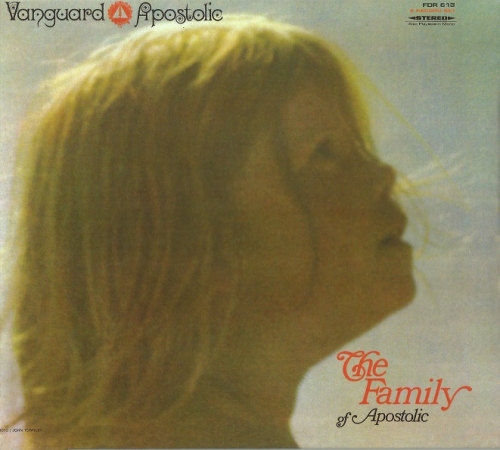
Artist: The Family Of Apostolic
Title: The Family Of Apostolic
Year Of Release: 1968/2016
Label: Future Days Recordings
Genre: Folk Rock, Psychedelic Rock
Quality: Mp3 320 / Flac (image, .cue, log)
Total Time: 58:37
Total Size: 204/401 Mb (scans)
WebSite: Album Preview
Title: The Family Of Apostolic
Year Of Release: 1968/2016
Label: Future Days Recordings
Genre: Folk Rock, Psychedelic Rock
Quality: Mp3 320 / Flac (image, .cue, log)
Total Time: 58:37
Total Size: 204/401 Mb (scans)
WebSite: Album Preview
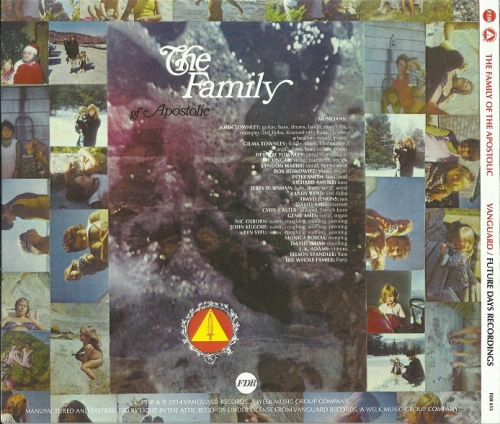
Tracklist:
1. Redeemer (John Townley) - 2:03
2. Zoo Song (Gilma Townley) - 2:37
3. Spring Song (John Townley) - 1:55
4. Down The Road (John Townley, Gilma Townley) - 2:37
5. Please Be Mine (John Townley) - 1:47
6. Did You Like The Party (Robert Berkowitz) - 2:33
7. Fiddler A Dram (John Townley, Jay Ungar) - 2:54
8. Bubbling Brook (Instrumental) (John Townley, Jay Ungar) - 3:25
9. I Won't Be Sad Again (John Townley) - 2:10
10. Old Grey House (Robert Berkowitz) - 3:00
11. Dholak Gheet (Jay Ungar, Lyndon Hardy) - 4:02
12. Doin' A Stretch (John Townley, Gilma Townley) - 3:15
13. The Lone Pilgrim (Trad. arr John Townley) - 3:00
14. Water Music (Instrumental) (John Townley) - 1:40
15. Grotesque Silly Bird (Gilma Townley) - 5:52
16. Taking Me Home (Diedre Heather Townley) - 2:34
17. O Splendour (Arr. David Ames) - 1:14
18. Lilting Lil (Gilma Townley) - 2:25
19. Mabel's Umbrage (Instrumental) (Gilma Townley) - 3:59
20. Devil's Yard (Gilma Townley) - 1:21
21. Personality (John Townley) - 1:52
22. Saigon Girls (Instrumental) (Alan Gordon, Garry Bonner) - 2:24
Gilma Townley - Bass, Drums, Fiddle, Harmonium, Organ, Piano, Tambourine
John Townley - Banjo, Bass, Cover Art, Delruba, Drums, Engineer, Guitar, Krummhorn, Mandolin, Photography, Piano, Producer, Rauschpfeife, Vocals
David Ames - Clarinet
Genie Ames - Organ, Vocals
Richard Amster - Bass
Bob Berkowitz - Organ, Piano
Jerry Burnham - Bass, Drums, Vocals, Wind
Cyril Caster - French Horn, Trumpet
Lyndon Hardy - Tambourine, Vocals
Travis Jenkins - Saxophone
Peter Smith - Bass, Oud
Ellson Standler - Flute
Deirdre Townley - Harmonium, Vocals
Jay Ungar - Mandolin, Violin, Vocals
Its name suggests a Christian folk record, but that only begins to describe the The Family of Apostolic, originally released on Vanguard in 1968 and now reissued by Light in the Attic. The album is an enchanting, mind-expanding relic whose pleasures are as simple as old folk songs and as strange as a 19-member family made up of brothers, ex-spouses and friends who came together as an unconventional musical unit.
Apostolic studio took its name from a source that was not spiritual, but technical, its then-unusual setup reflecting the number of Apostles. Founder John Townley was a member of New York garage band The Magicians (their “Invitation to Cry” was compiled on the very first Nuggets comp), and grew tired of the subpar conditions of major label Columbia’s recording studio. He thought he could do better, and after inheriting $85,000, he did, expanding the then-standard eight-track console to 12, replacing knobs with faders – standard stuff now, but a revelation in 1968. While the studio is merely an electric conduit, Apostolic gave artists like the Grateful Dead and others who flocked to the Greenwich Village loft a chance to have each track serve as a musical evangelist, spreading love through music.
Despite the sprawling cast, the album is John Townley’s musical vision. It starts with “Redeemer,” an electric 12-string rocker whose lyrics support their inspirational name: “Jesus Christ our redeemer/ Gave his life for love of men/ Oh say are you a true believer?” The song’s tone and pacing suggests a medieval hymn, but the instrumentation suggests the Byrds. This two-minute opener is an effective mission statement. But, as the album does throughout its four LP sides, it immediately shifts gears to the strange dirge-like “The Zoo Song,” a piano-vocal track improvised by Townley’s ex-wife Gilma. Townley was inspired by avant-garde filmmaker Stan Brakhage and turned this into a sound collage with various animal sounds. It’s an unusual use of the 12-track technology, but this seemingly primitive children’s song (with sinister chords) is a celebration of creation.
“Spring Song” is the kind of charming Americana you’d expect to hear in Greenwich Village in 1968. But you can hear why Vanguard Records, who specialized in more conventional folk music (and more poorly recorded, Townley would add), was frustrated by Townley’s refusal to adhere to a single style. The label marketed three singles from the album, but each was listed under a different artist. The most unusual of these was “Saigon Girls,” the uncommercial instrumental collage that ended the album; it was bizarrely credited to “The Spirit of Khe Sahn” and issued in a picture sleeve that depicted an airplane’s wing flying above a cloud bank.
A more logical single would have been “Did You Like the Party,” whose fuzzy organ timbres and modest Monkees-like vocals could have turned it into an AM staple. More typical of the album is a down home folk version of the blues standard “Junco Partner,” called “Down the Road“ in this version. The history of this particular song is a lesson in ecumenical genre-crossing, as it has been covered in reggae, R&B and punk versions, the latter connected to another ambitious multi-album set: Sandinista!
Townley’s then three-year old daughter Deirdre is pictured on the album cover and performs on its strangest track, “Taking Me Home.” This is more than just a child’s musical experimentation; Townley explained that his daughter was “concentrating on the beat tones and overtone series between her voice and the pump organ she was fingering at the time. Children do that naturally, adults have to be trained to it.”
In 1968, the notion of the communal family may have suggested the sinister designs of the era’s most infamous family. But The Family of Apostolic is wholesome, homegrown music whose freewheeling nature looks forward to a 1976 album that is also in Light in the Attic’s reissue catalog: Have Moicy!, by folk singer Michael Hurley with The Unholy Modal Rounders, Jeffrey Frederick and The Clamtones. Both are varied folk albums that play on the fringes of the genre; the difference is that Townley strays even farther from the norm. This is an album that isn’t afraid to explore, a sensitive, nearly psychedelic piano ballad called “The Old Grey House” followed by an arrangement of the Punjabi folk song “Dholak Gheet.” When it strays from the folk-rock template, this album may put off listeners who want albums to stick to one course. But it is the nature of this spirited family to invite everybody to the musical table.~Pat Padua
Apostolic studio took its name from a source that was not spiritual, but technical, its then-unusual setup reflecting the number of Apostles. Founder John Townley was a member of New York garage band The Magicians (their “Invitation to Cry” was compiled on the very first Nuggets comp), and grew tired of the subpar conditions of major label Columbia’s recording studio. He thought he could do better, and after inheriting $85,000, he did, expanding the then-standard eight-track console to 12, replacing knobs with faders – standard stuff now, but a revelation in 1968. While the studio is merely an electric conduit, Apostolic gave artists like the Grateful Dead and others who flocked to the Greenwich Village loft a chance to have each track serve as a musical evangelist, spreading love through music.
Despite the sprawling cast, the album is John Townley’s musical vision. It starts with “Redeemer,” an electric 12-string rocker whose lyrics support their inspirational name: “Jesus Christ our redeemer/ Gave his life for love of men/ Oh say are you a true believer?” The song’s tone and pacing suggests a medieval hymn, but the instrumentation suggests the Byrds. This two-minute opener is an effective mission statement. But, as the album does throughout its four LP sides, it immediately shifts gears to the strange dirge-like “The Zoo Song,” a piano-vocal track improvised by Townley’s ex-wife Gilma. Townley was inspired by avant-garde filmmaker Stan Brakhage and turned this into a sound collage with various animal sounds. It’s an unusual use of the 12-track technology, but this seemingly primitive children’s song (with sinister chords) is a celebration of creation.
“Spring Song” is the kind of charming Americana you’d expect to hear in Greenwich Village in 1968. But you can hear why Vanguard Records, who specialized in more conventional folk music (and more poorly recorded, Townley would add), was frustrated by Townley’s refusal to adhere to a single style. The label marketed three singles from the album, but each was listed under a different artist. The most unusual of these was “Saigon Girls,” the uncommercial instrumental collage that ended the album; it was bizarrely credited to “The Spirit of Khe Sahn” and issued in a picture sleeve that depicted an airplane’s wing flying above a cloud bank.
A more logical single would have been “Did You Like the Party,” whose fuzzy organ timbres and modest Monkees-like vocals could have turned it into an AM staple. More typical of the album is a down home folk version of the blues standard “Junco Partner,” called “Down the Road“ in this version. The history of this particular song is a lesson in ecumenical genre-crossing, as it has been covered in reggae, R&B and punk versions, the latter connected to another ambitious multi-album set: Sandinista!
Townley’s then three-year old daughter Deirdre is pictured on the album cover and performs on its strangest track, “Taking Me Home.” This is more than just a child’s musical experimentation; Townley explained that his daughter was “concentrating on the beat tones and overtone series between her voice and the pump organ she was fingering at the time. Children do that naturally, adults have to be trained to it.”
In 1968, the notion of the communal family may have suggested the sinister designs of the era’s most infamous family. But The Family of Apostolic is wholesome, homegrown music whose freewheeling nature looks forward to a 1976 album that is also in Light in the Attic’s reissue catalog: Have Moicy!, by folk singer Michael Hurley with The Unholy Modal Rounders, Jeffrey Frederick and The Clamtones. Both are varied folk albums that play on the fringes of the genre; the difference is that Townley strays even farther from the norm. This is an album that isn’t afraid to explore, a sensitive, nearly psychedelic piano ballad called “The Old Grey House” followed by an arrangement of the Punjabi folk song “Dholak Gheet.” When it strays from the folk-rock template, this album may put off listeners who want albums to stick to one course. But it is the nature of this spirited family to invite everybody to the musical table.~Pat Padua

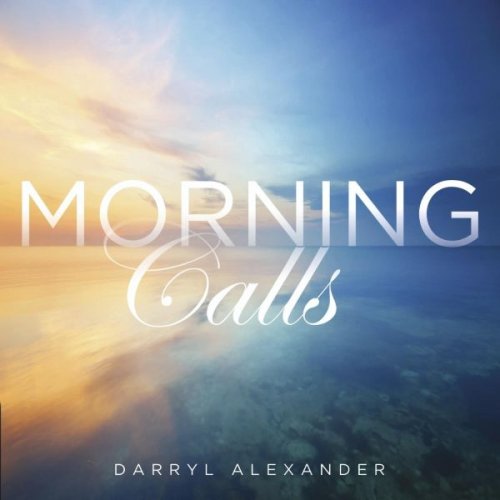
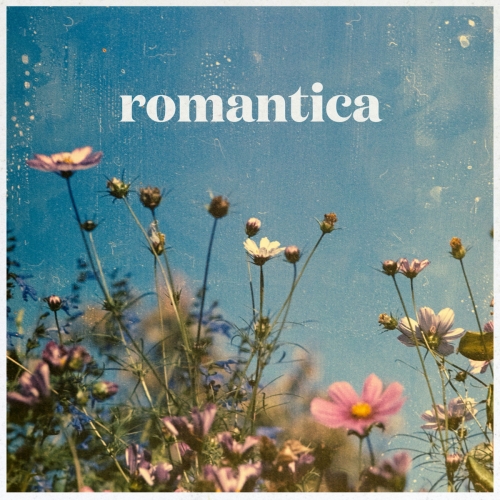
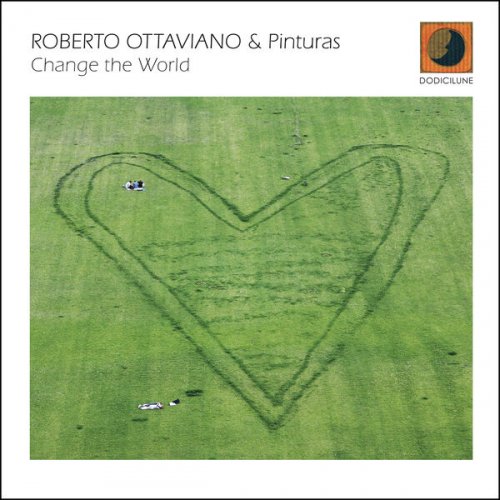
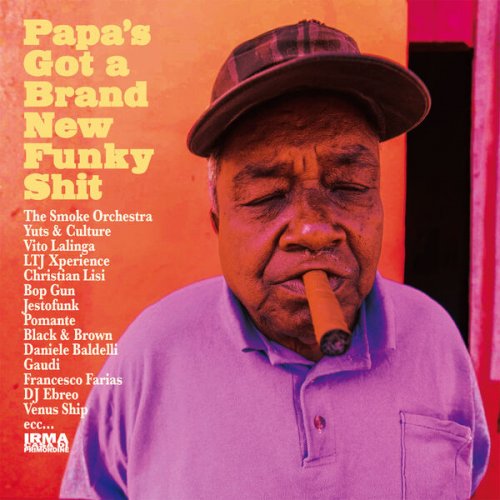
![The Mood Mosaic - Erotheque (Unleashing Groovy Musical Lust) (2026) [Hi-Res] The Mood Mosaic - Erotheque (Unleashing Groovy Musical Lust) (2026) [Hi-Res]](https://www.dibpic.com/uploads/posts/2026-02/1770314023_cover.jpg)
![Keyvan Chemirani - Tales of Nar (2026) [Hi-Res] Keyvan Chemirani - Tales of Nar (2026) [Hi-Res]](https://img.israbox.com/img/2026-02/05/2f0crjk19rw3dp7xd5h38ofxr.jpg)
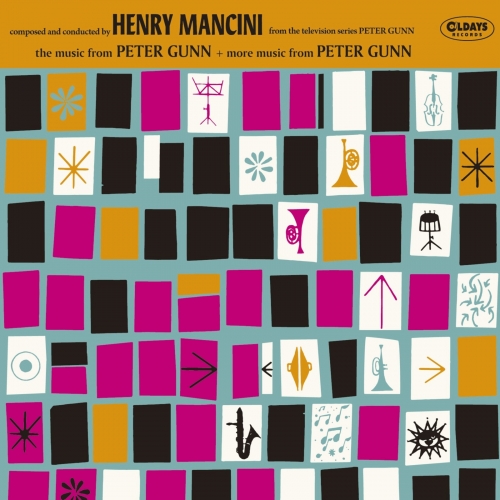
![FŒHN - Soleil de Minuit (2026) [Hi-Res] FŒHN - Soleil de Minuit (2026) [Hi-Res]](https://www.dibpic.com/uploads/posts/2026-02/1770357244_gm1m1pna2mo8k_600.jpg)